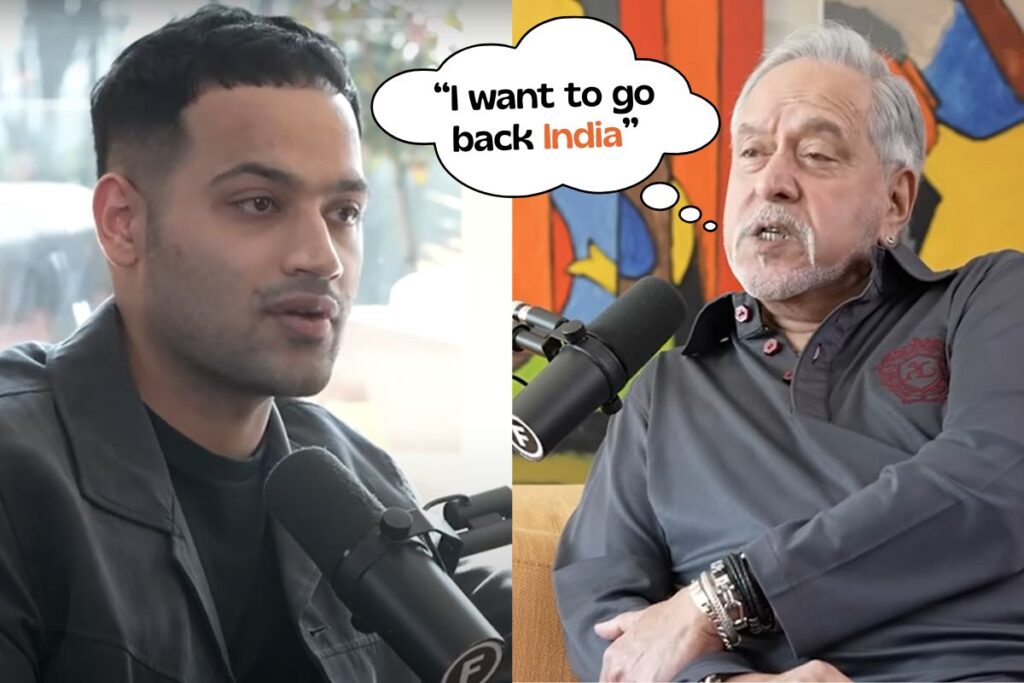Vijay Mallya, the former head of Kingfisher Airlines and a well-known business figure in India, recently appeared on a podcast hosted by Raj Shamani. It was his first long interview in years, lasting over four hours. This interview has caused quite a stir in political, legal, and business circles back in India.
Mallya’s Version of Events
In the podcast, Mallya addressed many points that have been debated in public for nearly a decade. He said he did not run away from India. According to him, he left the country on a pre-planned business trip and only stayed abroad after his passport was cancelled.
He claimed that he told the then Finance Minister Arun Jaitley that he was leaving, though he didn’t describe it as a formal meeting. This part has attracted major political criticism, especially from opposition parties.
He made it clear that he does not see himself as a criminal. “Call me a fugitive if you must, but don’t call me a thief,” he said. He argued that the banks had recovered more money from him than what he owed—more than Rs. 14,000 crore against a loan of Rs. 6,000 crore, as per his claim.
Apology to Kingfisher Employees
During the podcast, he also offered an apology to the former employees of Kingfisher Airlines. Many had gone unpaid and struggled during the downfall of the airline. Mallya said he had tried to pay them but was blocked by legal hurdles and court decisions.
Whether this apology was accepted or seen as genuine is still a matter of debate, but it was one of the few times he addressed their suffering directly.
Comments on Indian Business Environment
Mallya also criticised the business climate in India. He described it as extremely difficult to navigate, especially when politics gets involved. He said that he had to manage relationships with dozens of chief ministers and government agencies, which added pressure.
According to him, promises of ease of doing business didn’t match his real-world experience.
Political Reactions
The interview quickly made headlines in India, not just for what Mallya said but also for how political leaders reacted.
Congress spokesperson Pawan Khera brought up Mallya’s claim of informing Arun Jaitley before leaving and used it to accuse the government of letting him escape. The phrase “Narendra-Surrender” was brought back into political discussion.
The ruling party didn’t respond with the same force. So far, BJP leaders have mostly remained silent or dismissed the podcast as a distraction. But it did trigger fresh debate about how someone under financial investigation managed to leave the country so easily.
Legal and Extradition Status
Vijay Mallya continues to stay in the UK, with Indian officials on a persistent mission to extract him from there. Though a court of England cleared his extradition some years back, it is yet to materialise.
One of the reasons is the legal challenges that have been put forth regarding the state of Indian prisons, maintaining that they do not meet the standards of acceptable human intervention due to lack of basic human rights.
Mallya stated on the podcast that he would think about coming back to India if he is assured of being given a proper trial and dignity.
Perhaps he meant that in plain political terms he is still holding onto the option of coming back, although what is quite vague in the context of law is judicial openness in India.
Public Reaction and Media Buzz
The podcast gained huge attention on social media. Some people supported Mallya’s side of the story, while others criticised him harshly. The public remains divided—some see him as a scapegoat, others as someone who took advantage of the system.
Memes, short clips, and quotes from the interview spread fast online. News outlets picked up key parts and turned them into headlines. In a media space often full of short attention spans, Mallya managed to dominate the news cycle for at least a few days.
Why This Podcast Matters
This wasn’t just another podcast episode. It gave a voice to someone who had been silent for a long time. Whether people believe him or not, it pushed old questions back into public view: How did he leave India? Did the government know? Why hasn’t he been brought back?
The conversation has now moved beyond just Vijay Mallya. It’s about trust in institutions, fairness in business, and accountability in politics. And that’s why people are still talking about it.
Final Thoughts
Mallya brought specifics—Jaitley, trial standards, employee sentiment, and business hurdles. Some may call it orchestrated; others will say it’s overdue clarity.
It doesn’t end his legal woes. India’s courts, banks, and the UK’s justice system still hold their cards. But this podcast has jolted the conversation.
All eyes are on what happens next—within courtrooms, in the halls of Parliament, and across social media feeds.

